9+ Sample Summer Research Proposal
-
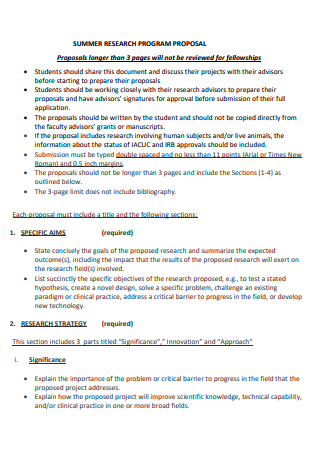
Summer Research Proposal Template
download now -
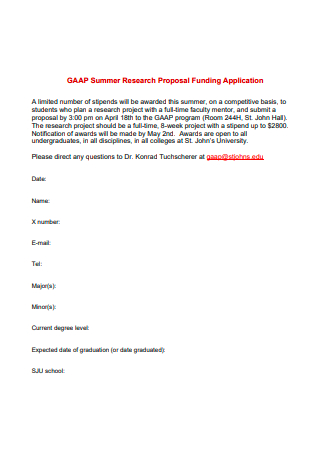
Summer Research Proposal Funding Application
download now -
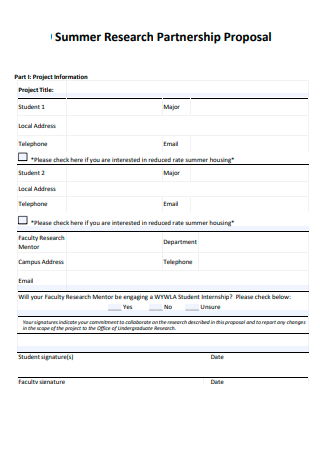
Summer Research Partnership Proposal
download now -
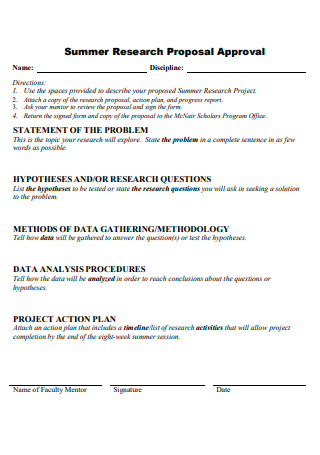
Summer Research Proposal Approval
download now -
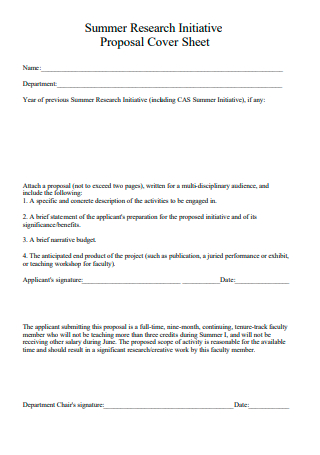
Summer Research Initiative Proposal
download now -
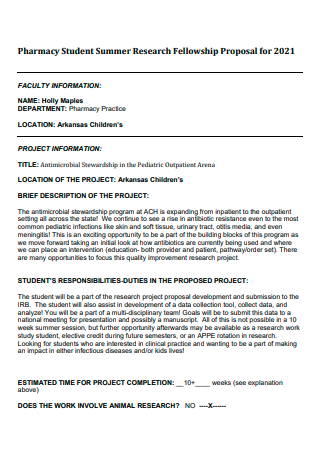
Pharmacy Student Summer Research Fellowship Proposal
download now -
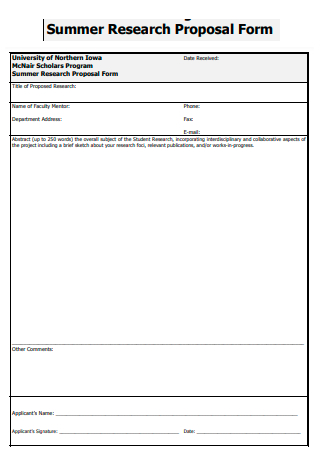
Summer Research Proposal Form
download now -
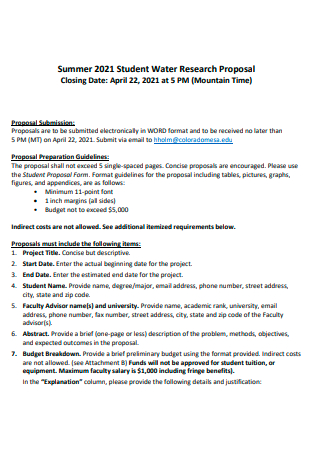
Summer Student Water Research Proposal
download now -
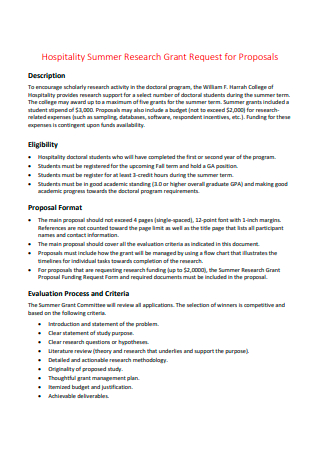
Hospitality Summer Research Grant Request For Proposal
download now -
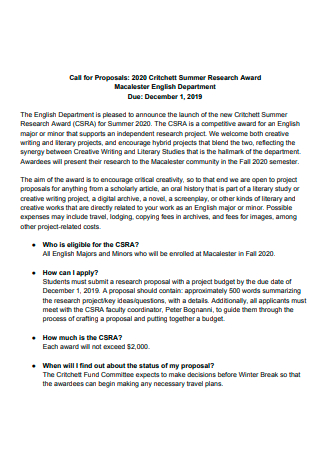
Summer Research Award Proposal
download now
FREE Summer Research Proposal s to Download
9+ Sample Summer Research Proposal
What Is Summer Research Proposal?
What Is the Purpose of the Summer Research Proposal?
What Are the Guidelines in Writing a Summer Research Proposal?
Challenges in Writing a Research Proposal
How to Write a Summer Research Proposal
FAQs
Importance for Research Proposals?
What Are Summer School Programs?
How Long Is a Research Proposal?
In order to complete their assignments for master’s and doctorate level degrees, students must create a research proposal. Writing a research proposal can be difficult due to the length of the document, the number of research questions it contains, and the sophisticated research process it entails. Students must grow and improve their topic knowledge, as well as their academic writing skills, in order to successfully navigate such hurdles. However, having such abilities and knowledge is not always enough; you must also be skilled in executing and presenting your ideas and collected information in an organized manner to your audience in order to be considered successful. In contrast, this web page will instruct you on how to strengthen your writing skills and how to compose a research proposal.
What Is Summer Research Proposal?
A summer research proposal is a paper that describes the research you intend to perform, why it is important, and the techniques you will use to carry it out. The deadline for submission is at the end of the summer semester. The summer is a great time for students to unwind and relax, but it is also an excellent opportunity to complete rigorous studies during this period. Students will have extra time to dedicate to their studies this summer because courses will be suspended for the duration of the summer. For the purpose of obtaining authorization from senior faculty members, faculty members write summer research proposals that they then distribute to their undergraduate and graduate students. A research proposal, on the other hand, is a critical component of academic writing, and should not be overlooked. It is written in order to dig into a specific subject and give new proposals based on notions that have not yet been examined. The research proposal provides an explanation of why the study is being carried out. As a result of incorporating this information into your thinking, your theories and approaches will be enhanced. A research proposal requires the ability to write persuasively as well as conduct research in order to succeed. They will require the appropriate talents in order to complete their project. Other proposal templates are available on our website, and you can use them whenever you need them. They are as follows: summer research program proposal, summer graduate research proposal, summer research funding, summer research project, undergraduate summer research, faculty-student summer research, summer research mini-grant request, summer research committee grant, new business proposal, APA research proposal, free proposal, and other similar proposal template are available. This post will not only provide you with templates but will also provide you with important information that you need to know in order to complete your template.
What Is the Purpose of the Summer Research Proposal?
In order to write anything, whether it is an essay or a thesis, or dissertation or anything else, it is always a good idea to first draft your work in advance. In your draft, you can write down ideas as they come to you, and you can revise them afterward. No particular order or structure is required for this to occur. Once your copy is complete, you may create your layout and arrange it in a logical sequence so that your viewers can grasp what you’re writing about.
A research proposal performs a similar function in a way to a research proposal. A research proposal also serves to provide an overview of the research topic so that your instructor will understand what topic you have chosen for your research paper as well as why the topic is argumentative and whether or not you have provided sufficient evidence to support your argument after reading your proposal. As a result, the question of what is the Purpose of a Research Proposal is answered in a straightforward manner.
What Are the Guidelines in Writing a Summer Research Proposal?
Your research topic is as one-of-a-kind as you are, and expressing yourself in your writing with your real voice is essential. Take the following points as a guideline. Attending an information session will provide you with further help on how to write a quality research application essay, which is highly recommended. The instructions that follow are suggestions to assist you in thinking about how to arrange your essay successfully and what to put in it. Allow yourself enough time to brainstorm, draft, and revise numerous times, just as you would with any good writing.
1. Create a Proposal that Is Unique to You
In order for your reader to comprehend your enthusiasm, devotion, and comprehension of your study subject, it is vital that they do so. Do not simply copy and paste paragraphs from earlier work or other proposals into your own work or proposal. Make your writing clear and concise; 1000 words is not a long amount of space, so choose your words wisely and with purpose. In explaining the work, explain why it is important to you and how it relates to your broader field(s) of study, use your own real voice to convey your feelings about it.
2. Describe Your Contribution to the Research
The goal of this grant is to cover the costs of your participation in the research. Consequently, clarify to the reader at the opening of your essay what you want to do and how you expect to benefit from the experience. You may accomplish this in a few phrases, which quickly establishes the tone of your essay and compels your reader to continue reading to learn more about the subject. You should elaborate on how you intend to contribute to the study in the remainder of your essay, outlining the actual research and how, if applicable, it might fit into a broader, continuing project.
3. Find a Suitable Medium
Divide your essay into thirds; the first third should discuss your engagement in the study, why it is important to you, how it fits into your own academic path, and why you are enthusiastic about it. The second third should discuss the research and how it relates to your own academic journey. Continue with the remaining two-thirds of the essay, utilizing those sections to fully define the project, its purpose, and its goals, and then conclude with a conclusion. At the very least, try finishing your essay with a quick remark on the educational benefits of conducting research in your field (s).
4. Consider and Discuss Your Team’s Performance
In your essay, explain how the contributions of your faculty mentor(s) and other members of your research team have aided your development as an undergraduate researcher. If you are writing on a research project of your own design, explain how your faculty mentor(s) have assisted you in defining your goals and objectives, as well as how they have guided you thus far and will continue to do so.
5. Provide a Contextualization for Your Research
Explain your understanding of the subject matter in sufficient depth so that your readers may comprehend exactly what you are trying to accomplish. Nonetheless, keep in mind that not every readership member is going to be an expert in your subject; hence, it is better to write for a well-educated, non-expert audience. Stay away from using too much jargon related to your field of study, define terminology, spell out or reference abbreviations correctly, and write clearly to ensure that your readers comprehend your research from both a micro and macro perspective. One of the most important aspects of any successful grant application is the ability to describe your work in sufficient detail to demonstrate your expertise on the subject while also conveying its contextual significance in ‘big picture terms. Moreover, it assists you, the undergraduate researcher, in better understanding the value of your work and how it contributes to your educational experience in a meaningful way.
6. Demonstrate Your Interest In and Commitment to Your Research Project
Allow your excitement and passion to permeate every aspect of your writing. In this way, your reader will be compelled to continue their own efforts to comprehend the significance of your work as well as how it fits into your own academic ambitions and career trajectory. You should also be clear and unambiguous about the feasibility of your work; as this award is just for the summer, you should be able to make considerable progress toward the completion of your work in around 3 months. Your plan should have a level of depth and breadth that is commensurate with the time frame you have set for it.
7. Make Use of Proper Citations
If you are writing an essay for an undergraduate course, you are expected to include proper citations for any sources other than your own. It will be penalized for essays that do not contain acceptable citations for all of the materials used, including quotations, graphs, statistics, figures, and other supporting materials.
Challenges in Writing a Research Proposal
You’re having trouble drafting a research proposal, aren’t you? You’re on the verge of missing a deadline and have no idea where to begin your assignment? If you answered yes! Our summer research proposal templates may prove to be the most suitable option. You will be able to acquire the best answers to all of your questions with a single phone call. We should look at some of the difficulties that students face when completing research proposal projects, though.
How to Write a Summer Research Proposal
For the most part, research proposals are essential because they help researchers practice identifying the logical steps they must take to achieve their research objectives and to be able to review, examine, consider, and evaluate different methods for collecting and analyzing data relevant to the research problem. Different fields will have different formats for summer research proposals, but they should all contain all of the important parts necessary in planning a finished research project, with enough detail to allow readers to assess the validity and use of your planned research. A research proposal is incomplete without the study’s findings and your analysis of those findings. Finally, the quality of your writing will be used to determine whether or not your proposal is effective, so make sure it is clear, cogent, and compelling. Now that you know what goes into a research proposal, let’s get started on drafting your own.
1. Introduction
This section will include an introduction to your study topic, as well as information on the background and current situation. You should regard your introduction as the first pitch of a concept or a full assessment of the significance of a research subject, even if it is merely a school assignment.
2. Research Design and Methodologies
Begin by defining your study methodology and the many methods you intend to use. In this area, you should explain how you intend to go about finding a solution to your research topic. Describe the overall study plan and the analysis methodologies that will be used to ensure that the problem is addressed correctly and that the results can be interpreted correctly. Your study’s design and methodology should reflect the study’s objectives.
3. Implications and Contribution
But even if this is just a draft, it’s important to be clear about how your research will add to the body of knowledge already available. Explain how, if your study is carried out as planned, it will lead to a new understanding of the research problem.
4. Budget
To be considered for funding, summer research submissions must include an approximate budget and cost for the research. There are numerous parts to this, including the monies required and where they should be allocated.
5. Conclusion
Summarize all you’ve said so far when you’ve reached your conclusion. Briefly describe the main goal, importance, and your thoughts on the subject. Emphasizing why your study is different and how it will contribute to the field’s body of knowledge.
6. Citations
Give credit where credit is due, as with any research article. This could be in the form of a bibliography or a list of references. Regardless of the format, the goal is to present all of the relevant literature that supports your research project as comprehensively as possible.
It’s a statement about your academic readiness and capacity, but it’s also a tribute to your faculty mentors, who serve as your sounding boards, and your readers, whom you hope will be inspired by your work. Clear, succinct, and articulate writing are hallmarks of great writing.
FAQs
Importance for Research Proposals?
To get your research study funded, you’ll need a research proposal. These are also criteria commonly imposed by schools and teachers on their pupils. So that they can practice their research abilities before going into the field.
What Are Summer School Programs?
Academic and nonacademic classes are offered over the summer months as part of summer school programs, which assist students to make up for lost time or enhance their education.
How Long Is a Research Proposal?
2,500 words and 3 to 4 pages should suffice, depending on the subject and the assignment’s requirements.
In most cases, summer break is the perfect time for students to unwind and enjoy some time off from their studies. However, for some pupils, being idle for an extended length of time can have severe consequences. This is why some teachers ask for summer study suggestions to keep their pupils busy over the break. Students in their final year of Ph.D. study typically write a research proposal. A solution to this question is to clarify the context of your project’s work. Writing a research proposal is an invaluable tool for students because it clarifies the most important aspects of their project and highlights any research gaps. To capture the full notion in a few pages, you’ll need to put in a lot of time and work. Having patience and putting a lot of effort into your research are both required.
